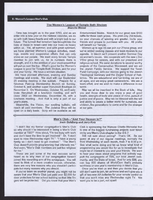Search the Special Collections and Archives Portal
Search Results

Daniel Tafoya oral history interview: transcript
Date
Archival Collection
Description
Oral history interview with Daniel Tafoya conducted by Laurents Bañuelos-Benitez and Barbara Tabach on December 12, 2018 for the Latinx Voices of Southern Nevada Oral History Project. In this interview, Tafoya discusses his early life in Albuquerque, New Mexico. He talks about his father's life story, his educational experience with learning disabilities, and joining the United States Air Force. Tafoya describes his career in the military, and being stationed at Nellis Airforce Base. Lastly, Tafoya discusses with involvement with the Clark County School District (CCSD) and with the Latin Chamber of Commerce.
Text

Transcript of interview with Renee Marchant Rampton by Dr. Caryll Batt Dziedziak, September 25, 2015
Date
Archival Collection
Description
Renee Marchant Rampton has often referred to herself as "One of Fifteen." Indeed, growing up in a family of fifteen children, Renee experienced the care of loving parents, the excitement of a bustling household, and the engagement of an active Church; all amidst the strains of a depression era economy. Renee's mother, Beatrice Marchant, provided Renee with a strong role model with which to emulate; a disciplined woman, who rose to the task without hesitation. Beatrice became the family's provider after her husband's debilitating stroke and later served in the Utah Legislature during the 1970s. Renee loved music from an early age. As a young child she found an early job as a piano accompanist for a dance studio. In 1956 she married musician, Roger Rampton, a successful percussionist. They soon settled in Las Vegas, where Roger performed on the Strip and they began raising their four children. It was an exciting period in Las Vegas history as the Strip attracted musicians and
Text

Transcript of interview with Sydney Wickliffe by Claytee White, February 1, 2013
Date
Archival Collection
Description
Sydney Wickliffe, nee Botkin, was born in Long Beach, California in 1944. Her parents, Donald and Betty Botkin, moved their young family first to Denver and then to the small town of Ulysses, Kansas before heading for Las Vegas in 1952, when Sydney was eight years old. Since then, she has called Las Vegas her home, graduating from Rancho High School's inaugural senior class in 1962. Growing up in a growing city, Sydney combined an active youth with long hours working in her father's North Las Vegas pharmacy and, later, would earn her degree in accounting from UNLV. As a CPA, she worked as an auditor for the Gaming Control Board and, in 1987, was promoted to deputy chief. From there, she took on the challenging role of director in Nevada's Department of Business and Industry as a member of Governor Kenny Guinn cabinet. As she says, even "one of the north-town girls" can go a long way - and in this interview, she shares memories that help us all see what the Las Vegas she remembers was like in the 1950s and 60s and how it helped to shape the person she is today.
Text

Transcript of interview with Charles W. Hunsberger by Stefani Evans and Claytee White, July 27, 2016
Date
Archival Collection
Description
It seems counterintuitive that a man who was raised a Mennonite, spoke Pennsylvania Dutch before he spoke English, and was destined to quit school after eighth grade to work on the family farm would grow up to become one of the most progressive and visionary library directors in the United States. His participation in the Building Las Vegas project results from his being responsible for building twenty libraries in Clark County during his 1971–1994 tenure as director of the Las Vegas-Clark County Library District. One of his first controversies was to insist on going to high school after his father demanded he quit. After graduating high school he went to Nigeria on behalf of his church, serving there for five years. Upon returning to the U.S., he found work at the Fort Wayne Library, albeit he was limited by how far he could advance because of his limited education. After attaining his library degree Indiana University at Bloomington he served as director at the Columbia City Library
Text

Transcript of interview with Patricia Ross by Judy Harrell, March 19, 2014
Date
Archival Collection
Description
Patty Ann Drew’s life experiences capture large movements in Las Vegas history: mob-dominated gambling, the Helldorado Rodeo, explosive growth, medical advances, and Clark County School District’s Sixth Grade Centers—all in a desert city centered in the Mormon Culture Region. Patty arrived in Las Vegas as an infant with her parents and older brothers in 1944 and was raised in the Huntridge area, where she and her brothers attended John S. Park Elementary School and matriculated from there to Las Vegas High School. In this interview, Patty talks about her parents working on the Strip, her school days, joining the Church of Jesus Christ of Latter-day Saints, marrying her high school sweetheart, and becoming a young mother in Las Vegas. After Patty married her second husband, Thomas Ross, the couple built a house west of Jones Boulevard and Patty gave birth to her third son. In addition, she returned to school to earn her Bachelor’s and Master’s degrees and taught at C. H. Decker Elementary School for twenty years.
Text

Craig Galati Interview, October 24, 2016: transcript
Date
Archival Collection
Description
always thought I'd be more urban. I would live in a downtown city. I wouldn't have a car. I would walk around. I would work on these big skyscrapers.” At one point in his life, architect Craig Galati dreamt of designing large buildings in some of the nation’s biggest cities. Instead, he was drawn back to his childhood home of Las Vegas, where he created projects meant to preserve the city’s integrity, such as the Grant Sawyer State Office Building and the first building at the College of Southern Nevada Charleston Campus. He speaks to his work in preservation at the Las Vegas Springs Preserve and in welcoming visitors to Mount Charleston with his Spring Mountains Visitor Gateway design. In this interview, Galati talks about his parents’ decision to move from Ohio to Nevada and what it was like growing up in Las Vegas. He recalls his first teenage jobs in the Las Vegas of his youth and his studies in architecture at the University of Idaho. He recounts the dilemma of struggling to find architecture work he enjoyed and how that vision drew him back to Vegas. He describes various projects in his portfolio from his early years to the present. He speaks highly of his partnership with Ray Lucchesi and the basis for their vision: “We wanted to be a place that everybody liked to work for. Buildings were just tools to do something grander. They weren't an object. We had a philosophy that was not object based, it was people based.”
Text

Leonard M. Jessup interview, August 6, 2018: transcript
Date
Description
“I decided to just keep going, and I devoted my career to higher ed. I wanted to continue putting back into this system that I felt I got a lot out of. Again, repaying a debt.” What began as a passion for playing school sports would later lead Dr. Len Jessup on a path to lifelong service in the area of higher education. From his California childhood he would soon find himself across different U.S. states performing various higher education duties from professor to university president. In this interview, Jessup talks about his grandparents’ decision to emigrate from Italy to the U.S. and how grateful he feels towards his family as a result. He recalls playing baseball in college. In his eyes, being part of several sports teams helped him develop into the person he is now. He describes doing research during at the University of Arizona and speaks to what it was like moving from one university position to the next. Ultimately, his colleagues would recommend that he move to Las Vegas to
Text

Transcript of interview with Robert "Bob"Agonia by Marcela Rodriguez-Campo, September 6, 2018
Date
Archival Collection
Description
Robert “Bob” Agonia (1938- ) was born in Garden Grove, California on a migrant camp made up of Filipino and Mexican-American workers. Agonia’s father was a farmer on a 70 acre farm owned by the Beggs family. Agonia did not spend much time living on the migrant camp, as his father moved the family to a private residence when Agonia was four. Agonia attended school, during an era of school desegregation in Garden Grove. He recalls that his mother dealt with segregation during her schooling, being forced to attend a school miles down the road from her home despite living across the street from another school. Agonia recalls his community being very diverse with families sharing Filipino and Mexican-American heritage and his neighbors being Japanese Americans. Agonia participated in a multicultural Boy Scout troop. After high school, Agonia joined the Peace Corps and served in El Salvador. While there, Agonia worked in an agricultural research center in Santa Tecla where he helped local farmers select the proper insecticide for their crops. After the Peace Corps, Agonia had his choice of government jobs, ultimately selecting to work for the Internal Revenue Service. Agonia’s work with the IRS is what eventually brought him from California to Las Vegas. He quickly realized that the type of IRS cases he would be handling in Las Vegas were completely different from the work he was accustomed to in California. One of those unique cases required him to close the doors of a downtown casino. Since moving to Las Vegas, Agonia was critical in establishing a Las Vegas LULAC chapter, an American GI Forum, an EEO council, and the UNLV Engineering school.
Text

Transcript of interview with Frankie Perez by Elsa Lopez and Laurents Bañuelos-Benitez, November 5, 2018
Date
Archival Collection
Description
Frankie Perez (1986- ) is an individual that constantly found himself navigating two worlds, whether it was military versus civilian; female versus male; or being Latinx in the United States. As a result of this navigation, Perez has a unique perspective on our ever more complicated world that not many individuals possess. Perez served in the military during the Do Not Ask, Do Not Tell policy which made it difficult for someone dealing with gender identity, to seek out the proper support they need. Despite the policy, and other policies that were put in place afterwards to inhibit the transgender community in the military, Perez began his transition while still serving his country. In direct contradiction of popular opinion, Perez discovered that the military easily accommodated his transition. Outside of the military Perez is an active voice in the LGBTQ community. As a member of the LGBTQ, Latinx, and military community, Perez has a unique perspective that he uses to fight for both LGBTQ and Latinx rights. Currently, Perez is finishing his degree in gender and sexuality studies at UNLV. He hopes to use his education to help people have the difficult discussions and improve conditions for his communities.
Text

